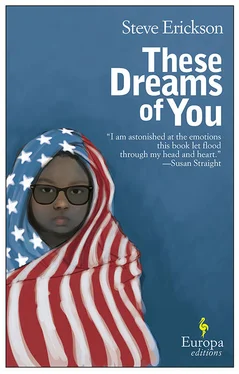“My wife is missing in Africa,” Zan explains as calmly as he can manage, “and now my daughter—”
“You best need to speak with the consulate general of the country where your wife—”
“I’m not here about my wife. I’m explaining how the situation came about. . ”
“Sorry?”
“How the situation came about. My daughter has gone missing with her nanny.”
“I see,” says the officer. Zan may be imagining the tone of accusation, but given his own sense of guilt and accountability it doesn’t matter: If I just had talked Viv out of. . out of. . what? Going to Ethiopia? Hiring someone to find Sheba’s mother? and he’s swept by nausea, certain he’s going to be ill in the middle of the station. He looks at Parker in the chair next to him, slumping as though to disappear down whatever hole might open up underneath and deliver him from this situation. “It happened yesterday,” says Zan.
“And you chose not to report it before now?” the officer says.
“I keep thinking she’ll come back.”
“Perhaps she will.”
“I just made a report yesterday to the Ethiopian embassy concerning my wife—”
“Mind, Mr. Nordhoc, we’re not the Ethiopian embassy.”
“I know that,” Zan says, breathing as deeply as possible, “I’m trying to explain why. . what my. . state of mind . . ”
“State of mind?”
“What my thinking was. . that she might come back—”
“What’s your business in London, if I may ask?”
“I gave a lecture at the university.”
“Can you describe the girl?”
Zan blurts, “She’s black.” Not “She’s wearing this or that,” not “Her body transmits music from far-flung stations of the universe.” He goes on, “She’s four. Years old.”
“Mrs. Nordhoc is black as well, then, I take it?”
“No,” but since the constable has made it clear that Viv isn’t the London police’s concern, Zan isn’t sure why this question is relevant. He explains, “We adopted Sheba. Zema.”
“Zema?”
“Her name’s not really Sheba.”
“Is it Sheba or Zema?”
“Uh. . ”
“You last saw her yesterday in Hyde Park near Kensington.”
“Yes.”
“It was Hyde Park proper rather than Kensington Gardens?”
“What?”
“It was Hyde Park proper rather th—”
“I don’t know. It was the park. She was with her mother, they were supposed to wait for us to come back from seeing the Ethiopian ambassador.”
The officer frowns. “Her mother?”
“What?”
“Her mother?”
“What about her mother?”
“You said she was with her mother. Your daughter was with her mother?”
“I said she was with her nanny. They were waiting—”
“I’m sorry, Mr. Nordhoc. But I assure you that you said her mother.”
“Are we,” Zan says angrily, “going to start arguing about what we said, like I have to do with the bank? My wife is missing. My daughter is missing. Why do I have to argue with everyone about what they said?”
“We’re not arguing about what I said, are we?” the officer answers calmly. “We’re arguing about what you said.”
“Dad,” Parker says quietly from his seat, “you said mother. Sorry.”
Helpless, Zan and Parker return to the hotel. Now everywhere Zan goes, every corner he turns, he hopes against hope that Sheba will appear before him. He feels himself sinking. His son watches him and whispers, It will be O.K., and Zan thinks, I should be telling him it will be O.K. Glancing at his cell, he notes that he’s missed another call from Brown, whose message is brief: “Alexander. James here. Ring me when you can,” but when Zan returns the call he once again gets Brown’s voice-mail.
Parker is on the laptop and Zan stands at the hotel window still thinking any moment he’ll see Sheba coming up the road, with the nanny or without her, when his son says, “The heck? Zan.”
“What?” says the father.
“Look at this.”
Zan surveys the website on the laptop where Viv’s name appears. “I don’t know what it means,” he says.
“It means,” Parker explains, “Mom has posted a message.”
Zan says, “It’s an email?”
“It’s a posting,” says the boy, “nobody emails anymore.”
“Mom sent us a message?”
“Not exactly a message, not exactly to us.”
“Parker,” the father quietly implores, “I don’t understand.”
“It’s for anyone who sees it.” In place of text is a photo. In the background of the photo is a monumental structure, six columns — though there are more corresponding columns behind the six — capped with a massive stone ledge. On top is the sculpture of a chariot, drawn by four horses and driven by a winged woman carrying a long scepter. At the end of the scepter is an Iron Cross, and above that a mighty bird spreads its own wings.
Zan knows he’s seen this structure. Out of it pours into the foreground of the photo a wide boulevard dotted with passers-by, one of whom, at the image’s forefront, is a woman disappearing off to the side of the photo. Though she’s slightly blurred, Parker says, “It’s Viv!”
Zan nods. “It does look like her.”
“But who’s taking the photo?” says Parker.
Zan says nothing, brooding over the image.
“Is that Ethiopia?” asks Parker. “Those people don’t look like Ethiopians.” He means they’re white.
“It’s not Ethiopia. I’ve seen this.” He points at the photo. “I don’t mean just pictures of it.”
“It’s London!” Parker exclaims. “Didn’t we see this the first or second day here, when we went to that über-creepy place below ground that wasn’t below ground and then that other creepy place they cut off the heads? Mom is here in London!”
In Zan, a flash of exhilaration wars with confusion, and loses. “We know it’s from Viv?” he says. He shakes his head trying to make sense of it when it hits him. “That’s not London,” he says, “that’s the Brandenburg Gate in Berlin.”
Zan collapses onto the bed. On his back he stares at the ceiling. “Where’s Berlin?” says Parker.
“Germany,” says Zan.
“Germany’s its own country, right?”
“Yes.”
“Why’s Mom there?”
“I don’t know.”
“Why would she post a photo?”
“I…well, she’s a photographer. . ”
“Dad!”
“I don’t know.”
“If she’s not in Ethiopia, why doesn’t she call? Why doesn’t she—?”
“Stop, Parker,” the father says, covering his face with his hands.
Parker says, “Do you want to answer?”
“What?” says Zan.
“Comment? On Viv’s photo? Post a reply?”
“You can do that?” and his son sighs deeply. The photo feels to Zan like a bulletin, a flare shot into cyberspace—“like,” Zan says not really to Parker but out loud, “I’m supposed to go get her.”
“How far is Germany?”
“I’ll take the train,” Zan is thinking out loud, “I don’t have the money for a plane ticket. . ”
“I, I, I,” says Parker, “what, you think you’re leaving me here?” because momentarily Zan has forgotten he doesn’t have a nanny: and then he realizes, But what about Sheba? This cannot be , he silently prays to the choice before him. He can’t leave his daughter who already has been passed off three times in her short life and feels herself stranded whenever anyone exits whatever room she’s in. You left me in London , he already hears someday’s cry of betrayal.
Читать дальше











